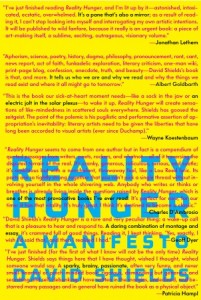Reading David Shields’ ‘Reality Hunger’
Author: William Johnson
October 6, 2010
Chat between my friend T and I:
T: I saw your post on Facebook that said you were reading Reality Hunger. I picked it up and I really love it. My friend [insert famous author name here] just won the [insert famous American book award here] and I cannot get through ten pages of it. It’s full of beautiful sentences and I JUST DON”T CARE. I love [insert famous author name here] and I know he is an artist, who has perfected his sentences. I felt silly for sailing to sleep on the 3rd page—at noon!—but Reality Hunger kind of frees me from the need to read it.
Me: Yeah, recently I was reading a highly regarded literary novel and after reading a few pages I grew restless; I put the book down and went back to reading my friends’ Facebook status feeds, which seemed to be more succinct, interesting and filled with much more life/humor/humanity than the acclaimed—but hermetic—book I was “reading.” I blamed my attention span! The Internet has ruined my mind! I’ll never be able to read Henry James again! YouTube has crapped inside my thinking cap! But, Shields posits that maybe it’s not a bad thing that the multimedia onslaught has vanquished my desire to read these types of books. Maybe it’s the novelist’s job to keep up with the way we live. Maybe we shouldn’t have to slow down for a book. Maybe it’s a novelist’s duty—job, responsibility, whatever—to keep up with us.

David Shields’ Reality Hunger: A Manifesto is a book that serves as a sort of a meta-call to arms: Shields wants new literature—and other forms of art— to embrace the “complexities of the twenty-first century.”
Shields’ book is written in a series of short stanzas—almost like a literary Twitter feed. He uses an amalgamation of some 618 quotations, some that are his original thoughts and musings and others that are quotations from other writers and critics. He cuts and pastes the quotes together to form one central argument: Art should not deny the world, but learn how to continually reshape itself to maintain a voice in a rapidly evolving media environment.
He writes:
“It’s important for a writer to be cognizant of the marginalization of literature by more technologically sophisticated and more visceral narrative forms. You can work in these forms or use them or write about them or through them, but I don’t think it’s a very good idea to go writing in a vacuum. Culture, like science, moves forward. Art evolves.”
Shields champions art forms that engage, mirror, and speak to our current reality-obsessed, fast paced media and information-saturated cultural landscape. Shields does not want an unintelligent or “dumbed down” art, but he wants high-minded art to at least grapple with the new ways in which we crave beauty, experiences, and information.
Shields prefers the rawness and randomness of modernity over worked-over artifice—so think X-tube over Falcon Video Pacs. He prefers the “idea” itself in lieu of intricate plots structures that slowly deliver the “idea”—so think Jonathan Franzen’s lyrical essays over his novels. He prefers art that embraces the wonders of appropriation, juxtaposition, and collage—so think Hip-Hop, Tumblr websites, and Renata Adler’s novel Speedboat.
He does not view this preference—his hunger—as a bad thing, but as an opportunity to create dynamic art that stays engaged with the hyper—in every sense of the word—communal conversation.

